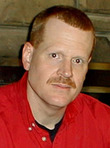Welllll . . .
I don't know when the book will come out; it is supposedly on Del Rey's 2011 schedule, but a lot depends on how much rewrite it'll need (it's fucking complicated, and I'm not sure it really makes sense), and what the workloads of my editor and the production department look like.
There will be no spoilers. Faithful Readers know how I feel about spoilers.
I will say, however, that the Acts of Caine have always been . . . well, I guess you could call them, loosely, revisionist SFF. Heroes Die was, in part, intended to provide an alternate paradigm for the reader's experience of heroic fantasy (and adventure fiction in general), which was radical for 1997, but looks pretty tame compared to what comes after. By shining a little more light on What Fighting Really Is, and What Kind of Demented Borderline Personalities You've Been Cheering For All These Years, I hoped to shift my readers' expectations for the genre, and to affect how they experience other works.
Of course, this was only a thematic motif, not the primary goal for the story; the primary goal was to nail your ass to a chair and keep you tuning pages and at the end, leave you feeling like you kind of lived through some of the shit in the book yourself. And make me rich and famous.
*sigh*
Anyway, by the time Blade of Tyshalle was coming out, some of that paradigm shift was already under way, due largely to the influence of GRRM, and besides, I'd already said what I had to say on the subject . . . so with Blade I though it would be interesting to ask my readers to reimagine and reinterpret what they'd read in Heroes Die in a way that (I hoped) would deepen their experience of both books.
Act of Atonement is about doing exactly that to Caine himself. We'll see whether it works, once it's all put together.
I had originally dreamed of allowing new characters to come forward and carry the story of the Earth/Overworld cycle . . . but I discovered that what most of the people liked wasn't the idea of the world, but the idea of Caine.
In retrospect, it's obvious, of course; but in my days as a young fan, the idea of a charismatic protagonist fighting to save/change/whatever the world and the people he loves was thought to be juvenile, retrograde, and mere pandering to the lowest impulses of the people who kept SF from being a respected literary genre. Robert Heinlein was dismissed as a second-rate fascist peddling third-rate Ubermensch technoporn; Robert E. Howard was regarded as a YA author, and not a very good one; Fritz Leiber was considered a Great Name in the Genre . . . as long as you stay away from his unfortunate Fafhrd & Mouser shit.
I grew up in the era of Great Writers Doing Great Fiction–Harlan Ellison went his whole career without creating a single protagonist more heroic than a dog named Blood and a misfit named Everett C. Marm. JG Ballard. Gene Wolfe. It's a long list. The "Great Writers Doing Great Fiction" is not sarcastic–it's what they really were, and what they were really doing.
Heroic SFF was relegated to "hacks ripping off Tolkien," "hacks ripping off Conan," the neurasthenic lassitude of Moorcock's Elric, and the psychotic sadomasochism of John Norman's Gor.
It's probably fair to say that the entire genre was saved by Roger Zelazny, Terry Brooks, David (& Leigh) Eddings, and Bob Salvatore. (Donaldson rides the rail, being that he used the traditional trappings of quest fantasy but hung them on a powerless, morally compromised and arguably delusional leper–kind of a metaphor for the life of a fantasy novelist, huh?).
At any rate, this book (as it stands, and subject to revision) carries the following warning:
AUTHOR'S NOTE
Several parts of this story take place before the events depicted in Act of Atonement Book I, Caine Black Knife. Other parts of this story take place after. Still other parts take place before and after both. Some parts may be imaginary, and some were real only temporarily, as they have subsequently unhappened.
'Nuff said.
Matthew Woodring Stover's Blog
- Matthew Woodring Stover's profile
- 989 followers



